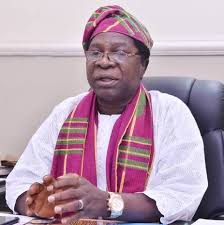A former Deputy President of the Nigeria Labour Congress (NLC), and former General Secretary of Nigeria Union of Petroleum and Natural Gas Workers, (NUPENG), Hon. (Comrade) Joseph Iranola Akinlaja, has expressed concerns regarding President Bola Tinubu’s administration’s intentions to use part of over N22 trillion pension funds for infrastructure development in Nigeria, adding that the funds are exclusively for workers’ pensions after their retirement.
Akinlaja, who was also a two-time member of the Federal House of Representatives in a chat with with some journalists at his Lagos residence on Thursday, May 8, 2025, advised the government to perish the plan, citing potential negative impacts on Nigerian retirees who depend on their pensions after their active life in service.
The foremost labour leader emphasized that Nigerians were skeptical about the government’s intent to use pension funds to support national growth and infrastructural development.
According to the Ondo born politician and businessman, there was need for the government to adhere to the provisions of the Pension Reform Act of 2014 (PRA 2014) and the revised Regulation on Investment of Pension Assets by the National Pension Commission (PenCom), while also stressing that accountability, transparency, fiscal discipline and the rule of law should never be compromised or violated.
Akinlaja also cautioned against exceeding the regulatory investment limit of the pension funds.
He said, “While I have tremendous regard for this government, we must also not lose sight of some Nigerians who are skeptical about the government’s plans to use pension funds for infrastructure development, judging from the experience of the past; many public funds had been looted, and in some cases when such looted funds were recovered they were not properly channeled to judicious use.
“In the developed countries, for example, such pension funds are borrowed or loaned to the government to address infrastructure deficits. As we all know this is workers’ money and all workers will not go on pension the same day, so this gives the opportunity for the government to use such funds for public interest in record time and later repay the money back to the pension account after utilizing it accordingly and appropriately.
“Before 2003, workers in the public service were on non-contributory pension schemes. That period, the pension arrangement was not beneficial to Nigerian workers because it was subjected to budgetary vagaries of the government. Therefore, retirees who served the nation during their youthful years were made to go through hell. These are people who have contributed to the economic development of the nation. It would be totally unfair to make them suffer non-payment of their pensions and gratuities as of when due. Stories abound of pensioners who slumped and died while queuing to get their pensions. Some pensioners even went to Abuja to picket the government, some of them slept there for months, eating and sleeping in the open air in protest against non-payment of their pensions and gratuities. Never should we go back to those dark and horrifying eras again.
“Meanwhile, it wasn’t an easy task for us, the leadership of NLC back then, but we succeeded in doing what we needed to do, to ensure that the public sector tapped into the benefits of contributory pension scheme like their counterparts in the private sector.
“In the private sector at that time, pensions and gratuities were on contributory scheme where workers contributed and employers on their parts complimented the contributions for pensions and gratuities. These funds were set aside and given to Actuarial insurance companies to manage profitably for collection by workers when they eventually retire. Through that system, the money was for the workers and properly planned in such a way that both employers and employees can’t touch the money. The Actuarial companies also added dividends to the money, so the money was not only safe but also increased in volumes where it was kept.
“Instead of an Actuarial companies for the private sector, the pensions funds of the workers both in public and private sectors of the economy was now given to Pension Funds Administrators (PFAs) by choice of the workers with a commission established by law to be responsible for regulating, overseeing, and guaranteeing the responsible governance of pension affairs in Nigeria, known as the National Pension Commission, and the 2004 Pension Reform Act established it. By this, the money was to be kept with the PFAs for safekeeping and for easy payment of gratuities and pensions when the time was right. Now, barring any bureaucratic bottlenecks, pensioners should be able to collect their pensions and gratuities as at when due and seamlessly.”
Giving outright disapproval to the government’s intentions on pension funds, the one-time General Secretary of NUPENG has this to say:
“If government will now deep its hands on the money meant for pensioners and not pay back to the covers of the pension funds, as some people have anticipated based on the benefits of hindsight, the government should please distance itself from the pension funds. If allowed, it would amount to double jeopardy for the real owners of the money, who could possibly be at their vulnerable state or so weak, due to old age. So what then becomes the fate of the workers when they retire from active service and are left with nothing to fall back to?
“We have seen how successive governments have recovered looted funds in the past and won’t be able to account for it. As we speak now, some government Ministries, Departments and Agencies have either delayed or failed to pay their own part of the contributory pension funds for the workers on their payroll, therefore there is trust deficit, it would be advisable for the government not to tamper with the pension funds, but to look elsewhere to fund infrastructure deficits in the country,” Akinlaja noted.













